How to Repair Your Credit

Credit report errors are more common than most people realize, affecting approximately one in five consumers according to Federal Trade Commission studies. These inaccuracies can range from simple data entry mistakes to more serious issues like mixed files or identity theft. When left uncorrected, even minor errors can significantly impact your credit score, potentially costing you thousands of dollars in higher interest rates on mortgages, auto loans, and credit cards.
Understanding what affects your credit score can help you identify potential issues before they impact your financial options. The good news is that you have legal rights under the Fair Credit Reporting Act (FCRA) to dispute inaccurate information and have it corrected or removed from your credit reports. Taking proactive steps to monitor and maintain your credit can save you significant money and stress in the long run.
The credit repair process typically involves three simple steps:
- Finding mistakes or outdated information in your credit report.
- Contacting the credit bureaus and filing a dispute for the errors you’ve identified.
- Having these errors removed or corrected on your credit report.
Below are the key actions to start your credit repair journey:
- Get your free credit reports – Under the Fair Credit Reporting Act (FCRA), you can obtain a free credit report once every 12 months from each of the three major credit bureaus: Equifax, Experian, and TransUnion. Visit annualcreditreport.com to request your credit reports online. You can also call 1-877-322-8228 to have your reports mailed to you (usually within 15 days). Please note you will be required to complete a verification process before receiving these reports.
- Review your credit reports and look out for errors – Here are some specific items you should carefully check:
- Incorrect or misspelled personal information (e.g., name, address).
- Late payments that were actually made on time.
- The same debt or charge appearing more than once.
- Closed accounts listed as open, or noted as “closed by grantor” if that isn’t accurate.
- Bankruptcy or negative information older than allowed (e.g., bankruptcies beyond 10 years, other negative data beyond 7 years).
- Unapproved or false inquiry details that should not appear on your report.
- Incorrect credit limit information or balances.
- Accounts not belonging to you but attributed to your name.
- Dispute errors and discrepancies with credit bureaus – You can send a formal dispute letter (or file online) with each credit bureau that has inaccuracies. Your dispute should include:
- A copy of the credit report(s) with each error clearly highlighted or noted.
- A written explanation of each mistake and what you expect the bureau to do (e.g., correct or remove inaccurate information).
- Copies (not originals) of any supporting documents proving the data is incorrect (e.g., payment receipts, correspondence from lenders, etc.).
- Your current contact information to ensure you receive a timely response.
Once the credit bureau receives your dispute, they typically initiate an investigation. You should expect a written response within 30 to 45 days. The bureau may either correct or remove inaccurate information, or they may verify the information if the creditor provides proof of its accuracy.
Besides these three core steps, make sure to also:
- Dispute the inaccuracies directly with your creditor or lender. They are the original source of the data submitted to the credit bureaus. If they are unaware of any mistakes, they may continue to resubmit the same erroneous information in the future.
- Focus on building and maintaining a positive credit history. Correcting past errors is only part of the process; equally important is practicing healthy financial habits such as paying all bills on time, keeping credit utilization low, and monitoring your credit regularly.
It can take six months or more for a credit score to fully reflect removed or corrected information. Meanwhile, consistently making on-time payments, creating a realistic budget, and avoiding maxing out credit cards can significantly boost your score over time. If you need immediate funding while working on credit repair, consider bad credit loan options that may be available to you.
In the world of credit, prevention is indeed better than cure. Rather than waiting until an error has negatively impacted your score, it’s wise to regularly review your credit reports to quickly spot and correct potential mistakes. For those looking to understand more about credit basics, our article on what makes a perfect credit score provides valuable insights.
Last updated on
 Tiffany Wagner
Tiffany Wagner 





